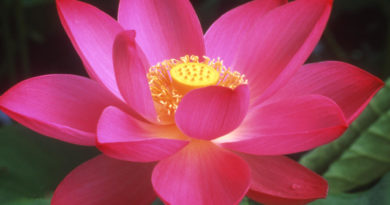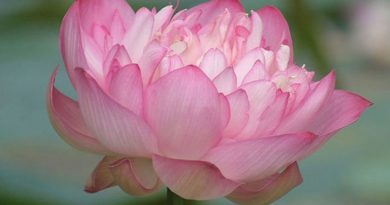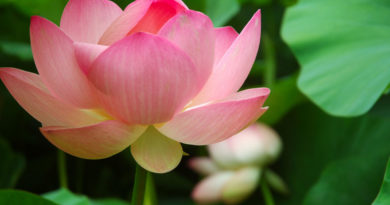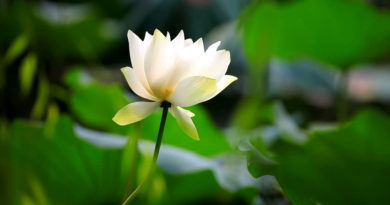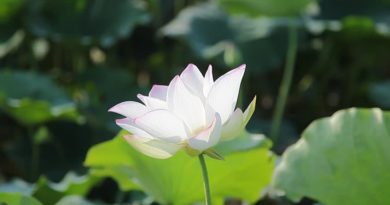Division Ii –– Nidāna Book 13 –– Dhātu Saṃyutta Chapter 4 –– Catudhātu Vagga
Sutta Pitaka
Saṃyutta Nikāya
Division II –– Nidāna
Book 13 –– Dhātu Saṃyutta
Chapter 4 –– Catudhātu Vagga
Namo tassa bhagavato arahato sammā sambuddhassa
13. 4. 1.
(30) Catusso — Four Elements
1. At one time the Blessed One was living in the monastery offered by Anāthapiṇḍika in Jeta’s grove in Sāvatthī.
2. “Bhikkhus, these four are the elements. What four? They are the element of earth, the element of water, the element of fire and the element of air. These are the four elements.”
13. 4. 2.
(31) Pubbe — In the Past
1. At one time the Blessed One was living in the monastery offered by Anāthapiṇḍika in Jeta’s grove in Sāvatthī.
2. “Bhikkhus, in the past, when I was yet an aspirant for enlightenment this occurred to me:
3. “What is the satisfaction, danger and the escape on account of the earth element? What is the satisfaction, danger and the escape on account of the water element? What is the satisfaction, danger and the escape on account of the fire element? And what is the satisfaction, danger and the escape on account of the air element?
4. “Bhikkhus, it occurred to me:
5. “Whatever pleasantness and pleasure arises on account of the earth element, that is the satisfaction in the earth element. That the earth element is impermanent, unpleasant and a changing thing is the danger in the earth element. Taming the interest and greed for the earth element and dispelling the interest and greed for the earth element is the escape from the earth element.
6. “Whatever pleasantness and pleasure arises on account of the water element, … re …
7. “Whatever pleasantness and pleasure arises on account of the fire element, … re …
8. “Whatever pleasantness and pleasure arises on account of the air element, that is the satisfaction in the air element. That the air element is impermanent, unpleasant and a changing thing is the danger in the air element. Taming the interest and greed for the air element and dispelling the interest and greed for the air element is the escape from the air element.
9. “Bhikkhus, until I thoroughly understood the satisfaction as the satisfaction, the danger as the danger and the escape as the escape from these four elements, I did not acknowledge that I have realized the incomparable rightful enlightenment to gods and men together with Māra and Brahma and the community of recluses and brahmins.
10. “Bhikkhus, when I thoroughly understood as it really is, the satisfaction as the satisfaction, the danger as the danger and the escape as the escape from these four elements, I acknowledged that I have realized the incomparable rightful enlightenment to gods and men together with Māra, Brahma and the community of recluses and brahmins.
11. “Knowledge too arose to me, the release of my mind is unshakeable, this is my last birth, there is no more re-birth.”
13. 4. 3.
(32) Acariṃ — I Wandered Searching
1. At one time the Blessed One was living in the monastery offered by Anāthapiṇḍika in Jeta’s grove in Sāvatthī.
2. “Bhikkhus, I wandered searching the satisfaction in the earth element. Whatever satisfaction there is in the earth element, I understood it. I have wisely and thoroughly seen the satisfaction in the earth element.
3. “Bhikkhus, I wandered searching the danger in the earth element. Whatever danger there is in the earth element, I understood it. I have wisely and thoroughly seen the danger in the earth element.
4. “Bhikkhus, I wandered searching the escape from the earth element. Whatever escape there is in the earth element, I understood it. I have wisely and thoroughly seen the escape from the earth element.
5-7. “Bhikkhus, I wandered searching the satisfaction … re … danger … re … escape from the water element … re …
8-10. “Bhikkhus, I wandered searching the satisfaction … re … danger … re … escape from the fire element … re …
11. “Bhikkhus, I wandered searching the satisfaction in the earth element. Whatever satisfaction there is in the earth element, I understood it. I have wisely and thoroughly seen the satisfaction in the earth element.
12. “Bhikkhus, I wandered searching the danger in the earth element. Whatever danger there is in the earth element, I understood it. I have wisely and thoroughly seen the danger in the earth element.
13. “Bhikkhus, I wandered searching the escape from the earth element. Whatever escape there is in the earth element, I understood it. I have wisely and thoroughly seen the escape from the earth element.
14. “Bhikkhus, until I thoroughly understood the satisfaction as the satisfaction, the danger as the danger and the escape as the escape from these four elements, I did not acknowledge that I have realized the incomparable rightful enlightenment to gods and men together with Māra and Brahma and the community of recluses and brahmins.
15. “Bhikkhus, when I thoroughly understood as it really is, the satisfaction as the satisfaction, the danger as the danger and the escape as the escape from these four elements, I acknowledged that I have realized the incomparable rightful enlightenment to gods and men together with Māra, Brahma and the community of recluses and brahmins.
16. “Knowledge too arose to me, the release of my mind is unshakeable, this is my last birth, there is no more rebirth.”
13. 4. 4.
(33) Yo no cedaṃ –– If There Weren’t
1. At one time the Blessed One was living in the monastery offered by Anāthapiṇḍika in Jeta’s grove in Sāvatthī.
2. “Bhikkhus, if there was no satisfaction in the earth element, beings would not have embraced the earth element. As there is a satisfaction in the earth element, beings embrace the earth element.
3. “Bhikkhus, if there was no danger in the earth element, beings would not have turned away from the earth element. As there is a danger in the earth element, beings turn away from the earth element.
4. “Bhikkhus, if there was no escape from the earth element, beings would not have escaped from the earth element. As there is an escape from the earth element, beings escape from the earth element.
5-7. “Bhikkhus, if there was no satisfaction … re … no danger … re … no escape from the water element … re …
8-10. “Bhikkhus, if there was no satisfaction … re … no danger … re … no escape from the fire element … re …
11. “Bhikkhus, if there was no satisfaction in the air element, beings would not have embraced the air element. As there is a satisfaction in the air element, beings embrace the air element.
12. “Bhikkhus, if there was no danger in the air element, beings would not have turned away from the air element. As there is a danger in the air element, beings turn away from the air element.
13. “Bhikkhus, if there was no escape from the air element, beings would not have escaped from the air element. As there is an escape from the air element, beings escape from the air element.
14. “Bhikkhus, until beings thoroughly understood the satisfaction as the satisfaction, the danger as the danger and the escape as the escape from these four elements, they did not live with an unrestricted mind, that has given up, detached and dissociated from the world, together with its gods, Māra Brahma and the community of recluses and brahmins.
15. “Bhikkhus, when beings thoroughly understood as it really is, the satisfaction as the satisfaction, the danger as the danger and the escape as the escape from these four elements, they lived with an unrestricted mind that has given up, detached and is dissociated from gods and men together with Māra, Brahma and the community of recluses and brahmins.
13. 4. 5.
(34) Dukkha — Unpleasantness
1. At one time the Blessed One was living in the monastery offered by Anāthapiṇḍika in Jeta’s grove in Sāvatthī.
2. “Bhikkhus, if the earth element was completely unpleasant, was oppressive and was a birth in unpleasantness beings would not have an attachment for the earth element. Bhikkhus, since the earth element is pleasant not oppressive and is a birth in pleasantness, beings attach themselves to the earth element.
3. “Bhikkhus, if the water element … re …
4. “Bhikkhus, if the fire element … re …
5. “Bhikkhus, if the air element was completely unpleasant, was oppressive and was a birth in unpleasantness beings would not have an attachment for the air element. Bhikkhus, since the air element is pleasant not oppressive and is a birth in pleasantness, beings attach themselves to the air element.
“Bhikkhus, if the earth element was completely pleasant, was not oppressive and was a birth in pleasantness beings would not have turned away from the earth element. Bhikkhus, since the earth element is unpleasant oppressive and is a birth in unpleasantness, beings turn away from the earth element.
3. “Bhikkhus, if the water element was completely pleasant … re …
4. “Bhikkhus, if the fire element was completely pleasant … re …
5. “Bhikkhus, if the air element was completely pleasant, was not oppressive and was a birth in pleasantness beings would not have turned away from the air element. Bhikkhus, since the air element is unpleasant oppressive and is a birth in unpleasantness, beings turn away from the air element.”
13. 4. 6.
(35) Abhinandaṃ –– Delight
1. At one time the Blessed One was living in the monastery offered by Anāthapiṇḍika in Jeta’s grove in Sāvatthī.
I
2. “Bhikkhus, he who delights in the earth element delights in unpleasantness. He that delights in unpleasantness, I say, is not released from unpleasantness.
3. “Bhikkhus, he who delights in the water element … re …
4. “Bhikkhus, he who delights in the fire element … re …
5. “Bhikkhus, he who delights in the air element delights in unpleasantness. He that delights in unpleasantness, I say, is not released from unpleasantness.
II
6. “Bhikkhus, he who does not delight in the earth element does not delight in unpleasantness. He that does not delight in unpleasantness, I say, is released from unpleasantness.
3. “Bhikkhus, he who does not delight in the water element … re …
4. “Bhikkhus, he who does not delight in the fire element … re …
5. “Bhikkhus, he who does not delight in the air element does not delight in unpleasantness. He that does not delight in unpleasantness, I say, is released from unpleasantness.
13. 4. 7.
(36) Uppado — Arising
1. At one time the Blessed One was living in the monastery offered by Anāthapiṇḍika in Jeta’s grove in Sāvatthī.
2. “Bhikkhus, the appearance, stability and rebirth of the earth element is the appearance of unpleasantness, the continuance of ailments and the manifestation of decay and death.
3. “Bhikkhus, the appearance, stability and rebirth of the water element, is the appearance of unpleasantness, the continuance of ailments and the manifestation of decay and death.
4. “Bhikkhus, the appearance, stability and rebirth of the fire element, is the appearance of unpleasantness, the continuance of ailments and the manifestation of decay and death.
5. “Bhikkhus, the appearance, stability and rebirth of the air element, is the appearance of unpleasantness, the continuance of ailments and the manifestation of decay and death.
6. “Bhikkhus, the cessation, mastery and disappearance of the earth element, is the cessation of unpleasantness, the mastery of ailments and the disappearance of decay and death.
7. “Bhikkhus, the cessation, mastery and disappearance of the water element, is the cessation of unpleasantness, the mastery of ailments and the disappearance of decay and death.
8. “Bhikkhus, the cessation, mastery and the disappearance of the fire element, is the cessation of unpleasantness, the mastery of ailments and the disappearance of decay and death.
9. “Bhikkhus, the cessation, mastery, and the disappearance of the air element, is the cessation of unpleasantness, the mastery of ailments and the disappearance of decay and death.
13. 4. 8.
(37) Samanabrahmana II — Recluses and Brahmins I
1. At one time the Blessed One was living in the monastery offered by Anāthapiṇḍika in Jeta’s grove in Sāvatthī.
2. “Bhikkhus, these four are the elements. What four? They are the element of earth, the element of water, the element of fire and the element of air. These are the four elements.
3. “Bhikkhus, the recluses and brahmins who do not know, as it really is the satisfaction, danger and the escape from the four elements are not my recluses or brahmins. Among recluses they are not recluses and among brahmins they are not brahmins. And these venerable ones will not by themselves realize and abide in the recluseship or become brahmins in this life.
4. “Bhikkhus, the recluses and brahmins who know, as it really is the satisfaction, danger and the escape from the four elements are my recluses and brahmins. Among recluses they are recluses and among brahmins they are brahmins. And these venerable ones will by themselves realize and abide in the recluseship or will become brahmins in this life.
13. 4. 9.
(38) Samanabrahmana II –– Recluses and Brahmins II
1. At one time the Blessed One was living in the monastery offered by Anāthapiṇḍika in Jeta’s grove in Sāvatthī.
2. “Bhikkhus, these four are the elements. What four? They are the element of earth, the element of water, the element of fire and the element of air. These are the four elements.
3. Bhikkhus, the recluses and brahmins who do not know, as it really is the arising, fading, satisfaction, danger and the escape from the four elements are not my recluses or brahmins. Among recluses they are not recluses and among brahmins they are not brahmins. And these venerable ones will not by themselves realize and abide in the recluseship or become brahmins in this life.
4. Bhikkhus, the recluses and brahmins who know, as it really is, the arising, fading, satisfaction, danger and the escape from the four elements are my recluses and brahmins. Among recluses they are recluses and among brahmins they are brahmins. And these venerable ones will by themselves, realize and abide in the recluseship or will become brahmins in this life.
13. 4. 10.
(39) Samanabrahmana III –– Recluses and brahmins III
1. At one time the Blessed One was living in the monastery offered by Anāthapiṇḍika in Jeta’s grove in Sāvatthī.
“Bhikkhus, these four are the elements. What four? They are the element of earth, the element of water, the element of fire and the element of air. These are the four elements.
2. “Bhikkhus, the recluses and brahmins who do not know the earth element, the arising of the earth element, the cessation of the earth element and the path leading to the cessation of the earth element.
3. “Bhikkhus, the recluses and brahmins who do not know the water element … re …
4. “Bhikkhus, the recluses and brahmins who do not know the fire element … re …
5. “Bhikkhus, the recluses and brahmins who do not know the air element, the arising of the air element, the cessation of the air element and the path leading to the cessation of the air element, they are not my recluses or brahmins. Among recluses they are not recluses and among brahmins they are not brahmins. And these venerable ones will not by themselves realize and abide in the recluseship or become brahmins in this life.
6. “Bhikkhus, the recluses and brahmins who know the earth element, the arising of the earth element, the cessation of the earth element and the path leading to the cessation of the earth element.
3. “Bhikkhus, the recluses and brahmins who know the water element.
4. “Bhikkhus, the recluses and brahmins who know the fire element.
5. “Bhikkhus, the recluses and brahmins who know the air element, the arising of the air element, the cessation of the air element and the path leading to the cessation of the air element, they are my recluses or brahmins. Among recluses they are recluses and among brahmins they are brahmins. And these venerable ones will by themselves realize and abide in the recluseship or become brahmins in this life.”


